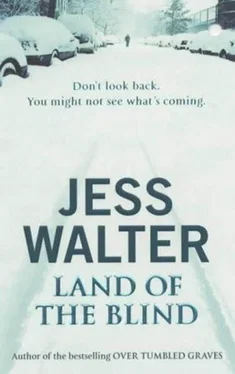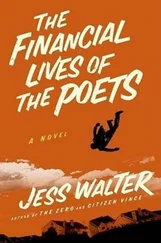Jess Walter - Land Of The Blind
Здесь есть возможность читать онлайн «Jess Walter - Land Of The Blind» весь текст электронной книги совершенно бесплатно (целиком полную версию без сокращений). В некоторых случаях можно слушать аудио, скачать через торрент в формате fb2 и присутствует краткое содержание. Жанр: Детектив, на английском языке. Описание произведения, (предисловие) а так же отзывы посетителей доступны на портале библиотеки ЛибКат.
- Название:Land Of The Blind
- Автор:
- Жанр:
- Год:неизвестен
- ISBN:нет данных
- Рейтинг книги:3 / 5. Голосов: 1
-
Избранное:Добавить в избранное
- Отзывы:
-
Ваша оценка:
- 60
- 1
- 2
- 3
- 4
- 5
Land Of The Blind: краткое содержание, описание и аннотация
Предлагаем к чтению аннотацию, описание, краткое содержание или предисловие (зависит от того, что написал сам автор книги «Land Of The Blind»). Если вы не нашли необходимую информацию о книге — напишите в комментариях, мы постараемся отыскать её.
Land Of The Blind — читать онлайн бесплатно полную книгу (весь текст) целиком
Ниже представлен текст книги, разбитый по страницам. Система сохранения места последней прочитанной страницы, позволяет с удобством читать онлайн бесплатно книгу «Land Of The Blind», без необходимости каждый раз заново искать на чём Вы остановились. Поставьте закладку, и сможете в любой момент перейти на страницу, на которой закончили чтение.
Интервал:
Закладка:
"There" was a small office on the second floor of a brick storefront in the funky Fremont neighborhood of Seattle, above a Greek restaurant, behind a door marked simply law office. The office smelled like feta cheese and tahini sauce, and was decorated with metal filing cabinets and a horrific nude self-portrait of Max in oil colors (Dr. Stanton called the hair. He was half Flathead Indian and half Jewish – "the first and last of my people" – and he credited this background for creating his heartbreaking sense of humor and his preternatural ability to abide suffering and deflect bullying.
Luckily, these were just the sorts of law he liked to practice.
"Look," he would say over the phone when some prosecutor was playing hardball on a plea bargain. "I am a Flathead Jew. You're welcome to keep busting my ass, but you'll have to forgive me if I don't fucking notice!"
He represented drug cases almost exclusively, and twice he came under investigation for taking his payment in product. Our office was even hit once. During the raid I stood next to Max, who smiled as filing cabinets and drawers were emptied on the floor. He wasn't a great lawyer, but the man knew how to hide a stash.
Unlike Dr. Stanton, when I confided in Max my plans for pro bono and legal social work, he beamed with pride. He got positively giddy about the hobo clinic and the Native People's Justice Center and the rest, nodding and grinning and planning right along with me. "Yes, I see it. We should get right on that, Clark. I know some influential people who will demand to fund this idea of yours. We'll have this thing up and running by the first of the year." I don't think he really knew any influential people – they certainly never came to our office – and anyway, we barely made enough on his drug cases to pay for our spot above the Greek restaurant, let alone do pro bono work.
I passed the bar, and by the spring of 1994, when I got a letter that would mark the beginning of this recent trouble, I was a bearded and ponytailed practicing lawyer and a junior partner in the two-person progressive law firm of Max Gerroux Law Offices. But before I detail the contents of that letter, I should make one more thing clear about Max, a detail that explains both Max and my deep loyalty to him.
He was dying. A snakelike tumor had taken up residence in his spine. It was wrapping around the bone and working its way through his body, wearing a kind of Ho Chi Minn Trail from his brain to his testicles. He had long ago given up on the doctors' ability to beat the tumor, saying that it seemed more natural to have the cancer kill him than the doctors. Everyone knew he was dying. He used this fact most effectively in court, pushing for speedier trials and expediting plea bargains and cutting through reams of legal bullshit ("We all know I won't be here to appeal this. Don't make me go
If this sounds manipulative, you will just have to take my word that he didn't wield his illness cynically or unnecessarily. In fact, he talked about his painful and insidious cancer so plainly and without affect that to this day, I consider matter-of-factness a form of courage. Some days we would be going over paperwork and he would make a small groan or squeeze his eyes tight – "Clark, I need to make a quick phone call" – and I would understand that he needed to get high to fight off the intense pain. It was also understood between us that I needed to protect my future as a lawyer by leaving the room, that I was to never witness his drug use – in case the cops returned to finish their raid. I honored the small deception and usually went for a walk down to Lake Union when I knew he was getting high. I was with Max for six months before I realized why we represented drug dealers: partly because Max honestly believed that the police violated civil rights in drug cases and partly because Max needed to be paid in dope.
As for me, I suppose I cared for Max out of a surrogate loyalty toward Ben, and as I watched Max's cancer progress, I concentrated on every detail, every wince and groan, those things I'd missed nine years earlier with Ben.
One day in the late spring of 1994, Max and I were working on an appeal, the paperwork spread out before us on his pressed-board desk. My mind was elsewhere, specifically on the aforementioned letter, which my parents had forwarded to me the day before. And so I didn't notice that Max was making small huffing noises, as if he was being punched in the rib cage. Finally, when I looked up, I could see that he was glistening with sweat and having difficulty breathing. His eyes were pressed shut.
"You need to make a phone call," I said.
He winced with pain. "I don't know if I can."
"Let me help," I said quietly.
"I don't think you should-"
"It's fine," I said.
"No."
"Please," I said.
He pointed to the oil painting of himself naked. I was shocked that it would be in such an obvious place. Even the cops had looked behind that painting. I took the painting down but there was nothing behind it on the wall, no safe or false panel. "Frame," he muttered. "Lower right-hand corner." I pulled the frame apart and saw it was hollowed out. A small ceramic pipe, matches, and a sandwich baggie of rich green marijuana slid out. I loaded the bowl and slid it between his quivering lips. I waved the match in a circle around the bits of green bud, and he inhaled with short, raspy breaths; the buds sparked red and burned away, and a line of gray-blue smoke issued from the pipe. Max's eyelids fluttered and he held the smoke in his lungs as long as he could, then let it seep out. A quiver of something – pain or relief, I'm not sure there was a difference – rolled through his body.
I refilled the bowl and held it out for him again.
"Thank you," he said, and smoked the second bowl. When we were done, I helped him lie on the couch in his office and I left to go for a walk. I walked through Fremont and down to the lake. I sat on the bank and watched some sailors working on an old crab ship, the hull rusted and streaked. I could hear them across the water, talking and laughing. I pulled the letter out of my pocket and read it again, for the tenth time that day. I will not recount it from memory, except to say it started with a plain, friendly greeting and an apology for not coming to Ben's funeral all those years ago. There was some business about how I hadn't been at the ten-year reunion and congratulations on becoming a lawyer. The rest of the letter I will quote from memory, because it is seared in my mind:
I'm going to be in Seattle on business next month and I thought maybe we could get together, if you want to. There's something I'd like to talk with you about.
I've been thinking a lot about you lately.
With love,
Dana
5
She was beautiful, even more than I'd remembered. Her hair was short and spiky, cut so that it framed her round face and dark eyebrows, her slender nose and round eyes, and made each of these features appear singular – as if they had been invented specifically for her face. But even more than her physical appearance, Dana Brett had acquired a comfort with herself, with her body; she wore a long, tight print skirt with no sign of her old smart-girl self-consciousness, and watching her walk in it, a man could be forgiven if he thought of trading everything – family, career, self-respect – for one day spent tracing that skirt's gentle roll over hips and thighs, to the calf, where a glimpse of smooth, tanned ankle revealed a simple silver bracelet, a dizzying piece of jewelry that was impossible to ignore, to avoid imagining it as the only thing left on her, gleaming in the light from a bedroom candle.
You may surmise by this description that I had been pining away for Dana during the twelve years that we were apart, but that's not exactly the truth. In general, I don't pine. As I have said, I continued to date, though it's true that Dana had never been far from my thoughts. And it was only at that moment, staring at the vision of Dana Brett outside the restaurant Cyclops (I know… but the food was good), that I understood why I'd dropped my habit of trophy blondes and had gone out of my way to date girls who were approximations of Dana, best-guess estimates of what she would be like now: smart, liberal, funky girls who wore hemp bracelets and crocheted hats and read poetry chapbooks and talked of saving sea mammals. When Ben died I lost the chance to live through his eyes, and while I didn't imagine that I loved Dana during those ten years, I think I did start to live through her eyes, to imagine that my new self might please her, as strange as that may sound. I always thought I would see her again, and part of me wondered if I would feel the way I eventually did feel that afternoon – pained, stricken, for the first time in my life, in love. I wasn't really surprised to feel like that, but I was surprised to find that the surrogates for Dana that I'd been dating were nothing like her, and had no more in common with her than with those sea mammals. For Dana wasn't simply another progressive arty chick. She was, as I said, singular, and no cheap granola knockoff could've captured her combination of natural beauty and self-confidence, all of these disparate elements held in place by the binding heat of her.
Читать дальшеИнтервал:
Закладка:
Похожие книги на «Land Of The Blind»
Представляем Вашему вниманию похожие книги на «Land Of The Blind» списком для выбора. Мы отобрали схожую по названию и смыслу литературу в надежде предоставить читателям больше вариантов отыскать новые, интересные, ещё непрочитанные произведения.
Обсуждение, отзывы о книге «Land Of The Blind» и просто собственные мнения читателей. Оставьте ваши комментарии, напишите, что Вы думаете о произведении, его смысле или главных героях. Укажите что конкретно понравилось, а что нет, и почему Вы так считаете.











